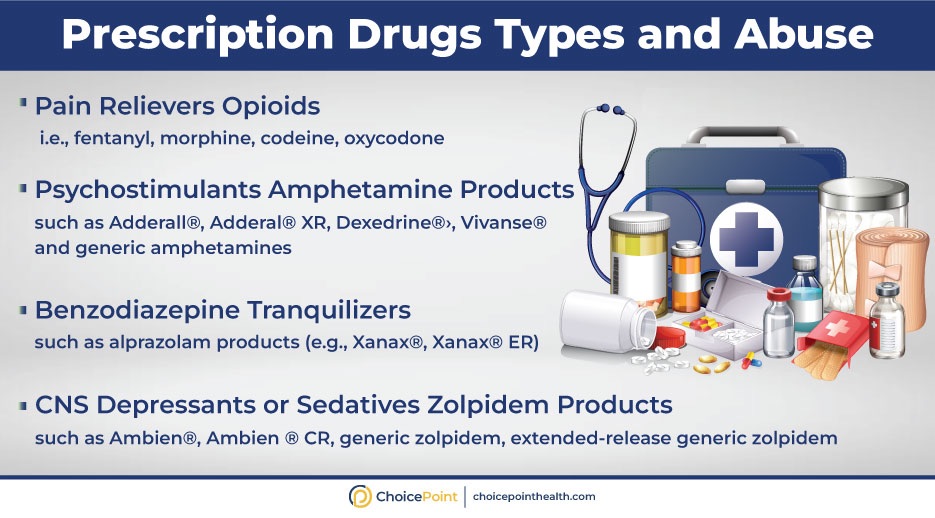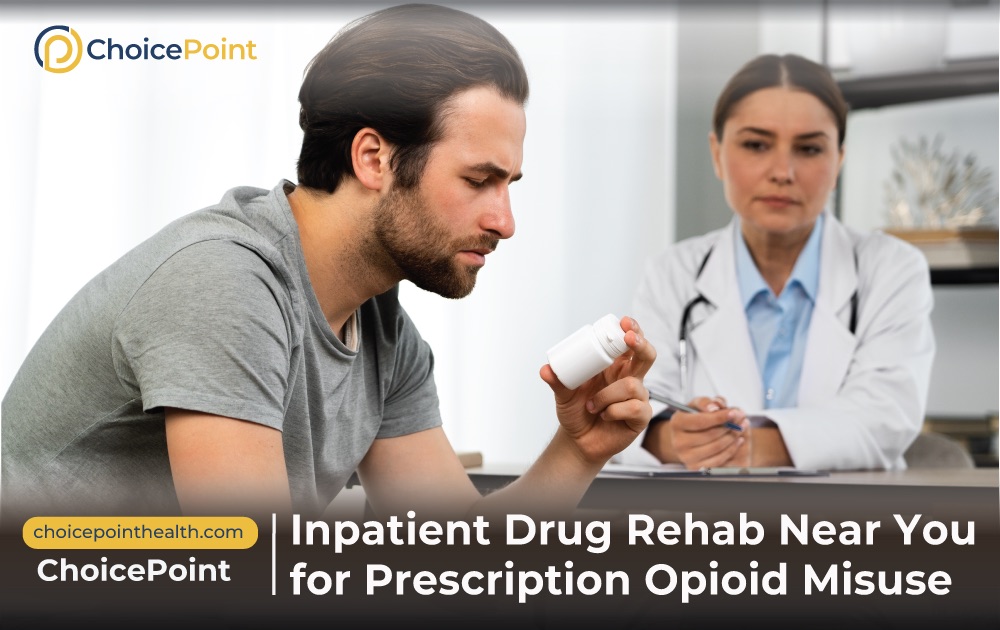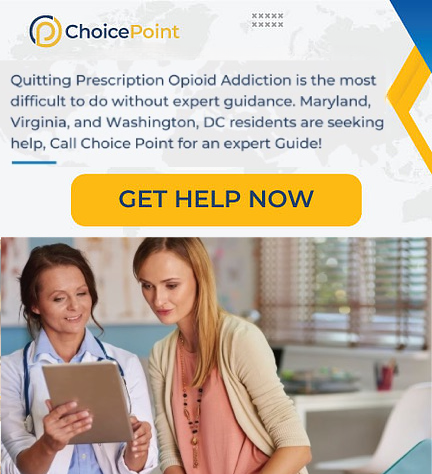People often look for inpatient drug rehab near me after they have failed to control the use of prescription opioids. Due to their highly addictive and fatal nature, prescription opioids have consumed 16,706 lives in the United States in 2021. Drug rehab involves an extensive treatment plan starting with detoxification and strengthening your body to live without physical or psychological dependence on opioids.
If you are a Maryland, Virginia, Washington DC, and South Jersey resident looking for inpatient drug rehab for prescription opioid abuse, get the help you need from ChoicePoint. Simply call us at 844.445.2563.

We Accept Most Insurance Programs, Including Tricare.
Table of Contents
Taking Prescription Opioids for Pain- Leading to Abuse
Prescription opioids are medications often prescribed for
- Moderate to severe pain
- Cancer
- Injury
- Surgery-related complications
One of the major setbacks of prescription opioids is related to their euphoric and tranquil effects on a person’s cognitive abilities, leading to addiction and physical dependence. This is why, in 2021, we witnessed 21% of drug overdose deaths due to prescription opioids.
The most commonly abused prescribed opioids for pain management are:
- Codeine.
- Fentanyl (Actiq®, Duragesic®)
- Hydromorphone (Dilaudid®)
- Meperidine (Demerol®)
- Methadone (Dolophine®)
- Morphine (MS Contin®)
- Oxycodone (Percocet®, Percodan®, Oxycontin® and Roxicodone®)
- Oxymorphone (Opana®)
Prescription Opioid Abuse; Treatment Plan at Inpatient Drug Rehab Near You
The opioid crisis demands extensive inpatient treatment to alleviate the potential risks of overdose and fatality, including medical detox and psychotherapy, as explained below.
a. Medically Supervised Detox
Drug rehab treatment starts with clearing a person’s body (blood and mind) from previous intoxications of prescription opioids and managing withdrawal symptoms according to the nature of prescription opioids.
The detox can be categorized into two for the type of prescription opioids, such as
Detox for Natural or Semisynthetic Opioids
These involve managing the following drugs out of the body while alleviating their withdrawal symptoms:
- Oxycodone (OxyContin®): has high euphoric effects with 81% of the supply users in America
- Morphine (Kadian®, Avinza®) is a major CNS depressant causing extreme addiction.
- Codeine®: High usage causes respiratory failure, coma, and eventually death.
- Hydrocodone® (Vicodin®) causes severe dry mouth and changes brain functioning when used for long periods.
All of these are naturally derived from opium or mixed in labs that caused 12,133 preventable deaths in the United States. So, getting their detox done under DEA-certified practitioners is necessary to avoid any fatal consequences.
Detox for Synthetic Opioids
One of the most common and current epidemic synthetic opioids that needs extensive detox is:
Fentanyl®
A completely synthetic opioid prescribed for chronic pain, 100 times stronger than morphine, consumed 71,000 lives in the US in 2021. It is the most dangerous form of prescription opioid being abused at the moment, causing
- Raised heartbeat
- High blood pressure
- Elevated temperature
- Respiratory depression and death
Fentanyl detox may involve medication only prescribed in inpatient drug rehab to gradually decrease dependence and manage basic withdrawal symptoms, as explained under the MAT heading.
b. Medication-assisted Treatment for Prescription Opioid Dependence
Research shows that 90% of prescription opioids do not work for chronic pains due to excessive use and tolerance build-up. To reinstate normalcy, inpatient drug rehab near you should dispense the following FDA-approved medications during detox to manage withdrawal symptoms.
Buprenorphine
It acts the same on brain opioid receptors available as subutex® and reduces withdrawal symptoms such as:
- Cravings
- Irritability and agitation
- Nausea and vomiting
- Insomnia
- Abdominal cramps and pain
It also reduces the risks of opioid overdose deaths. Doses are adjusted according to a person’s condition and improvement response.
Buprenorphine and Naltrexone
Both these medications work as agonist-antagonists and are available as suboxone® and help reduce withdrawal symptoms, cravings, and prescription opioid dependence simultaneously.
- Buprenorphine blocks opioid receptors by binding to them
- Naltrexone makes these receptors ineffective in opioid signals
Extended-Release Naltrexone
This works mainly by blocking opioids getting attached to brain receptors so a person will not get high if he takes prescription opioids while under naltrexone (vivitrol®) influence. Hence, it works best for preventing relapse. Majorly, it is given after opioid detox under careful observation to get better outcomes of abstinence.

Most Commonly Prescribed Drugs
c. Psychiatric Effects of Prescription Opioids and Treatment Plan at Inpatient Drug Rehab Near You
The above-mentioned side effects of prescription opioids only account for their physical nature. What is concerning is the psychiatric effects that arise due to long-term use of prescription opioids and severe psychological issues such as
- Slurred speech
- Confusion
- Depression
- Anxiety
- Stress
- Panic attacks
Leaving your mental health unattended while getting treatment at drug rehab is a major blow to your absolute sobriety. Because prescription opioids are a significant source of mental health disorders when dependence develops beforehand, cognitive therapy is necessary to maintain sobriety.
Get your Psychotherapies to avoid mental health disturbance at our inpatient drug rehab near you. Call now 844.445.2563 to discuss more!
Dual Diagnosis for Multimorbidity
Prescription opioids can have a greater risk of addiction and fatal consequences if a person has underlying mental conditions such as anxiety and depression. 51.4% of adults in the United States receive rigorous prescriptions for opioids each year, which builds tolerance and leads to mental health disorders.
To reduce national dependency and tolerance buildup, Critical measures at inpatient rehab involving dual diagnosis that deal with patients having:
- Prescription opioid addiction
- Mental disorder i.e. (PTSD, Depression, Bipolar, Traumas)
Psychologists at the inpatient drug rehab are trained in diagnosis, treatment, and maintaining cognitive abilities to the fullest through two main therapies:
- Cognitive-behavioral therapy aims at improvising strategies and new mindsets to improve thinking patterns and stress management
- Dialectical behavior therapy regulates emotional balance and improves agitated mindset through CBT.
Additional Psychotherapies
Almost 15% of adult employees in the United States get affected in the workplace due to substance abuse, including prescription opioids. Overusing prescription opioids while having mental disorders leads to
- Social deviation
- Social stigma
- Criminality
In turn, a person will exclude his relationships based on impaired cognitive functioning, which an inpatient drug rehab near you will reinvigorate through social therapies such as:
- Individual therapy with one-on-one sessions privately
- Group therapy with peer support group to weaken social anxiety elements at the workplace
- Family therapy to address restraining relationship elements
Get your personalized treatment and addiction therapy counseling through ChoicePoint. Call Now 844.445.2563 to book your appointment!
d. After Recovery Plan to Avoid Relapse
Research states only 35% of the patients remained sober after leaving rehab for opioid addiction. When you search for an inpatient rehab near me, find an extensive treatment program that includes any of the following.
- Follow-up care
- Relapse preventive plan
- Aftercare
Opting for one of these is essential to maintain recovery for a longer period and learn new coping skills to manage better triggers that may cause relapse of prescription opioids, which, in this case, are highly relapsing drugs.
Get our free addiction assessment before beginning your treatment journey. Call Now 844.445.2563 and discuss your evaluation report!
Get The Help You Need With Our Opioid Inpatient Drug Rehab Near You
Keep in mind when Henry Ford said, “Addiction is an adaptation. It’s not you–it’s the cage you live in.” We can help you, from breaking that cage to living free of addiction and prescription opioid dependence with the availability of commercial insurance programs, Tricare, and Personal Funds.
Our inpatient services are available in Washington, DC, Maryland, Virginia, and South Jersey. Let’s get started by verifying your insurance and discussing your treatment plan with our DEA-certified Practitioners.
Medical Disclaimer:
ChoicePoint aims to improve the quality of life for people struggling with substance use disorder and mental health issues. Our team of licensed medical professionals research, edit and review the content before publishing. However, this information is not intended to be a substitute for professional medical advice, diagnosis, or treatment. For medical advice please consult your physicians or ChoicePoint's qualified staff.










Review Inpatient Drug Rehab Near You for Prescription Opioid Misuse.